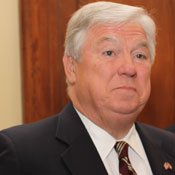After largely dodging cuts during the 2009 legislative session, public education in Mississippi absorbed the brunt of a new round of budget cuts that Gov. Haley Barbour announced Thursday. Education accounts for over half of the state's budget and $158 million of the $172 million in Barbour's new round of reductions.
"Although we struggled very hard last year to spare education from the budget axe, and were successful to a large extent, Mississippi cannot control spending without addressing the largest line item of our budget: education," Barbour said in a statement.
Barbour's revised budget cuts most public education line items by 5 percent, including the Mississippi Adequate Education Program, the state program that balances funding for low-income schools. Among the few line items that dodged a cut this time were salary supplements for National Board Certified teachers and Student Financial Aid for colleges and universities.
"Politically, he caught a lot of heat last year for cutting National Board Certified teachers," House Education Committee Chairman Cecil Brown, D-Jackson, said. "I'm sure that's why he took that off the table this year."
Barbour's cuts come on the heels of dismal news from the State Tax Commission. August tax collections were $5.5 million, or 1.69 percent below already conservative estimates, and 5.65 percent below last year's figures. August's report was a relative improvement from June, though, when state revenue fell $26 million, or 11 percent below projections.
The governor noted that his budget cuts still left education appropriations at a higher level than the previous fiscal year. Overall, the recent cuts leave K-12 education funding 1.9 percent above 2009 fiscal year levels and general support for institutions of higher learning 0.4 percent above its 2009 funding.
Without the federal stimulus package, however, those minor increases would have been dramatic decreases. The state's budget for K-12 is bolstered this year by $160.5 million from the American Recovery and Reinvestment Act, which Barbour railed against as addictive "one-time money." The stimulus package "masks the problem," Barbour warned attendees at the Neshoba County Fair on July 30.
"It is not sustainable to use temporary federal funds to push up K-12 spending by 7.2 percent when you're cutting law enforcement and other important state services," Barbour said. "When the extra federal money goes away, we will not be able to keep education spending at the top of that tall mountain because the rest of state government will have already been cut twice and probably a third time."
To Rep. Cecil Brown, D-Jackson, though, the stimulus package has proven its worth in recent months, as it props up state funding that would otherwise fall below previous levels.
Brown expects the most recent round of budget cuts to have severe effects on the poorest school districts.
"I think you're going to see some school districts that will make it through another year without any major problems," Brown said. "They'll cut back some. But then there are going to be other school districts that are going to be devastated by this."
Brown anticipates seeing cuts in non-classroom programs like extra-curricular activities and athletics, as districts try to trim fat from their budgets. Now that the school year has begun, though, any serious cost-cutting will have to target non-contract employees like teachers' aides.
"Personnel is where all the money is," Brown said.
For the Hazlehurst City School District, the latest cuts will erode recent financial gains. The district, which has been under state control since 2008, had just begun to operate with a budget surplus, said Suzanne Smith, the district's state-appointed financial adviser. Smith estimates that the latest cuts will erase $350,000 of the $380,000 fund balance surplus she had hoped to preserve until the end of the school year.
"My main concern is if we've suffered a 5 percent cut this early, will there be another cut to follow?" Smith said. "This first cut hurts and depresses us, but the second cut would be the cut where we need to make changes."
Because Hazlehurst eliminated some positions when the state first took the district over, the district has little remaining fat in its personnel budget, Smith added.
"We have the personnel that we have to have," Smith said. "You're going to have districts that can make that up by cutting positions, and you're going to have other districts that just can't. You get down to a certain point, and you can't cut personnel. You can't leave children unsupervised, obviously."
Education advocates can at least rest easy knowing that public education will not suffer more without other programs taking a hit. State law prohibits the governor from cutting any one agency by more than 5 percent of its original appropriation until all other agencies have been cut by 5 percent.
While many other state departments fell under the knife this time, Barbour spared two other major programs: Medicaid and Corrections. The $324 million Corrections budget and the $918 million Medicaid budget remained intact for the time being.



Comments
Use the comment form below to begin a discussion about this content.
comments powered by Disqus